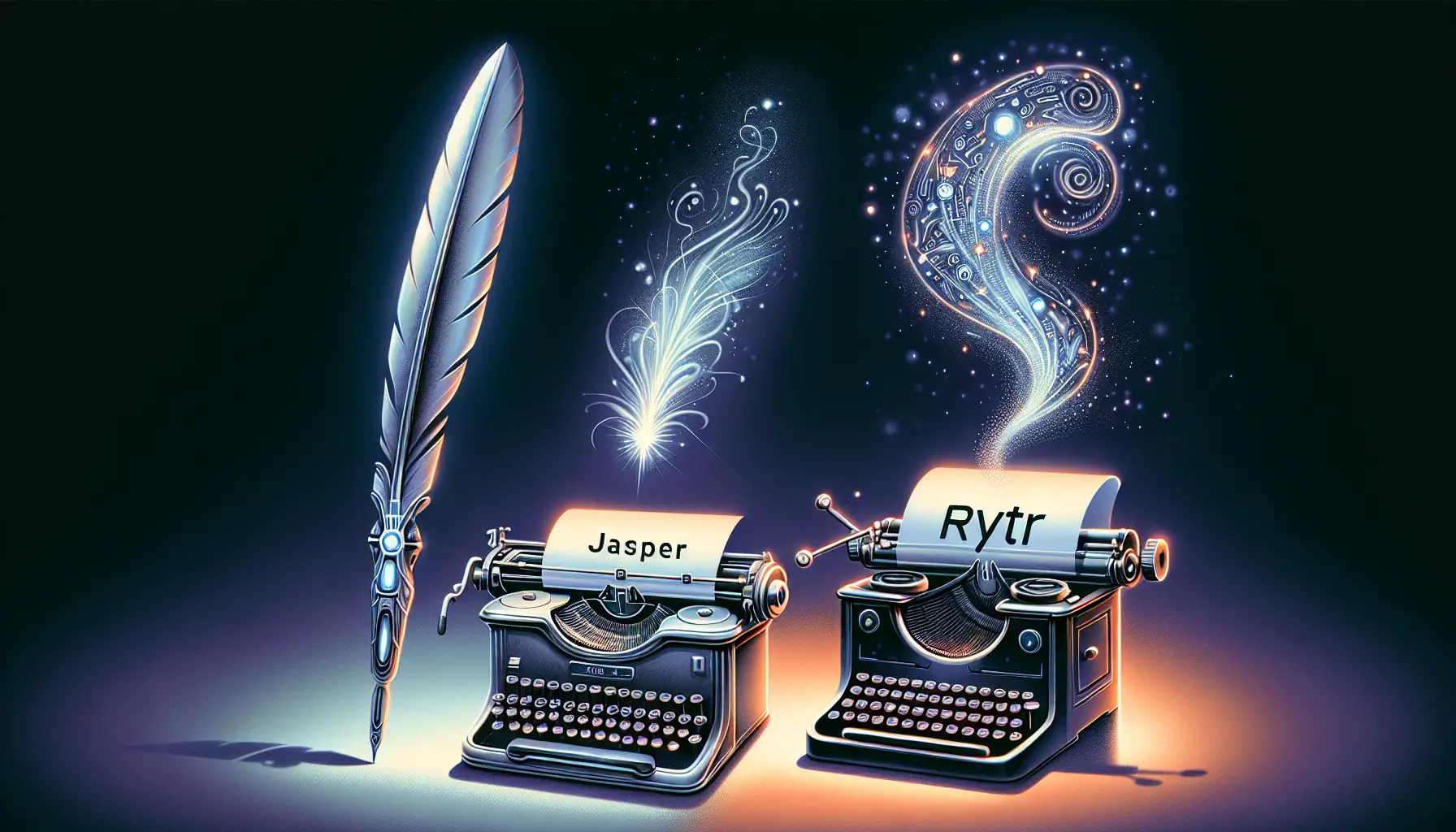Cut through the noise with our curated list of the best AI writing assistants on the market. Here, we’ll compare standout features, evaluate user-friendliness, and consider the value each brings to the table, helping you pinpoint the tool that will elevate your writing process most effectively.
Key Takeaways
- AI writing assistants, like Jasper AI, Rytr, and Copy.ai, use advanced NLP and machine learning to streamline content creation by providing unique features designed for generating different types of content, from emails to full articles.
- When selecting an AI writing assistant, key features include a user-friendly interface, affordable pricing models, writing style and language adaptability, smooth integration with existing workflows, and additional features like grammar checking and SEO optimization.
- While AI writing assistants enhance productivity, ensure consistency, and aid SEO; users must address limitations such as data bias and content originality through human oversight and continuous tool training, ensuring adherence to ethical guidelines.
The AI Writing Revolution

AI writing tools have transformed the world of content creation. These tools use algorithms and machine learning to generate a wide array of content, making a writer’s job easier and more efficient. Their primary purpose is to streamline the writing process to improve productivity and meet the demands of the digital age.
The evolution of these AI writing assistants has been propelled by advancements in natural language processing (NLP) and machine learning. These improvements have significantly enhanced their ability to produce contextually relevant text and understand linguistic nuances.
These AI writing tools employ large language models such as GPT-3 and GPT-4, which predict subsequent words in a given text. These predictions are based on extensive training data from books, articles, and the internet. This revolution in writing is just the beginning as AI tools continue to evolve and improve.
Top AI Writing Assistants in 2024

In 2024, the market will offer a variety of top AI writing assistants. Among these are Jasper AI, Rytr, and Copy.ai. Each tool caters to specific audiences and offers unique features that set them apart.
Let’s delve deeper into what each of these AI writing tools has to offer.
Jasper AI
Jasper AI, previously known as Jarvis AI, stands out in the market for its robust features and powerful content generation capabilities. It leverages natural language processing (NLP) algorithms to generate a variety of content formats through data analysis from multiple web sources, including engaging content for social media posts. Jasper AI is adept at understanding the nuances of different social media platforms, making it an invaluable tool for creating personalized and platform-specific content.
This AI writing tool offers several key features that make it a user favorite. These include:
- AI text generation
- Remix
- Chat features
- Collaborative opportunities within an intuitive system
These features make Jasper AI a versatile tool catering to various content creation needs.
Rytr
Rytr, on the other hand, is an affordable AI writing tool specializing in short-form content creation. Its compact interface facilitates users in performing various writing tasks within the same document efficiently, making it a go-to tool for crafting emails or generating social media profile bios.
Rytr’s affordable pricing model sets it apart, making it attractive to many users who need assistance with short-form content creation. Furthermore, it caters to a diverse user base with its support for multiple languages in content creation, making it a global-friendly tool.
Copy.ai
Lastly, Copy.ai is renowned for its intuitive and user-friendly interface. It makes it easy for users to start creating content quickly with a well-designed dashboard that simplifies template customization.
The user-friendly interface of Copy.ai reduces the learning curve for new users, allowing them to focus more on crafting engaging content.
It’s a tool designed with the user in mind, aiming to simplify the content creation process without compromising output quality.
Key Features to Consider
When choosing an AI writing assistant, certain key features should be considered. One of the most important is the user interface and experience. Not all tools are equally intuitive, and a user-friendly interface ensures writers can efficiently access and utilize the tool’s features.
Another significant factor to consider is the pricing model. AI writing assistants offer various pricing models, with some offering competitive and affordable options and others having higher pricing tiers. Finding a tool that fits your budget while meeting your content creation needs is essential.
The adaptability of the tool is also crucial. An AI writing assistant should offer style, structure, and vocabulary flexibility. This adaptability contributes to the quality and relevance of the content, allowing it to resonate with your target audience and meet specific content goals.
Another key feature is smooth integration capabilities, such as browser extensions and compatibility with widely used software. An effective AI writing assistant should align with the writer’s existing workflow, making the transition to using the tool seamless and efficient.
Lastly, it’s important to consider the specific features the AI writing assistant offers. Features such as:
- Writing templates
- Grammar checkers
- SEO optimization
- Support for various languages
should be assessed based on your particular writing tasks and requirements.
Benefits of Using AI Writing Assistants

There are numerous benefits to using AI writing assistants. One of the most significant is their ability to expedite writing tasks. This capability allows users to concentrate on other aspects of their business. Additionally, they can automate research, outlining, and drafting, further speeding up the writing process.
AI writing assistants also offer grammar-checking features. This not only saves time but also reduces human proofreading expenses. With an AI tool, you can ensure your content is grammatically correct before reaching a human editor.
Consistency is key in any writing style; this is another area where AI writing assistants excel. They ensure writing style consistency, which is crucial for maintaining a cohesive brand voice across various platforms.
SEO is another benefit offered by AI writing assistants. They can provide sophisticated SEO guidance, incorporating keyword research, SEO scoring, and competitor analysis to optimize your content for search engines.
Lastly, AI writing tools enhance creativity by providing suggestions and insights and overcoming writer’s block. By utilizing AI for writing, businesses can also reduce the overhead costs of content production, achieving cost efficiency.
Overcoming Limitations
Despite their numerous benefits, AI writing tools do have certain limitations. To maintain creativity and originality, these tools need to undergo continuous training. Users should also engage in human proofreading and verification of sensitive information. This prevents content from being generic or plagiarized and ensures the content remains unique and original.
AI writing tools, such as an AI writer or AI content generator, must better grasp context and tone. Creators should be sensitive to cultural nuances to produce content that resonates emotionally without being inappropriate or offensive to certain audiences.
One of the challenges with AI writing tools is data bias. Regular updates to the datasets used in these tools are essential to reduce this bias. These updates should be sourced from diverse and reliable sources to prevent the perpetuation of stereotypes.
Lastly, AI writing assistants need strong ethical guidelines, regular reviews, and training to fix new ethical issues. This ensures that the tools are:
- accountable
- transparent
- fair
- avoid unethical queries
To make these tools more accessible to non-technical users, user-friendly interfaces and resources such as tutorials and support are necessary.
Real-Life Use Cases
AI writing assistants have a wide range of real-life use cases. Marketers, for example, leverage AI writing tools like ChatGPT to craft campaign content. A notable example is Toutiao’s deployment of AI to author articles for the Rio Olympics.
AI assistants such as SEO.ai provide marketers with sophisticated SEO guidance. This includes keyword research, SEO scoring, and competitor analysis, enabling them to optimize their content for better visibility and higher search engine rankings.
In the world of eCommerce, AI writing assistants play a pivotal role. Nyle AI, for instance, is designed to meet the needs of eCommerce platforms. It offers tools and templates tailored to enhance online store content, helping drive customer engagement and sales.
AI writing assistants and AI writers facilitate efficient team-based content creation. Their collaboration and document-sharing features allow for real-time editing and commenting, making it easier for teams to collaborate on a single piece of content. The process becomes even more streamlined and efficient with the help of AI writing generators and AI writing software tools.
Integrating AI Writing Assistants into Your Workflow
Integrating AI writing assistants into content management systems can significantly streamline content production, especially when generating long-form content. These tools can seamlessly integrate into your existing workflow, making generating, editing, and publishing content easier.
The integration of AI writing assistants into your workflow offers several benefits:
- Enhances productivity
- Ensures consistent quality and style across all content
- Results in more cohesive and engaging content
- Improves your brand’s credibility and audience engagement.
Tips for Getting the Most Out of AI Writing Assistants
There are a few tips to remember to get the most out of your AI writing assistant. AI writing tools can inspire new ideas and provide alternative perspectives by analyzing large amounts of data and identifying patterns. This can help to spark creativity and encourage innovative thinking, making it the best AI writing solution for your needs.
Another tip is to leverage the machine learning capabilities of AI tools. These capabilities enable the tools to provide more intelligent and tailored topic suggestions as you continue to use them, helping to make your content more relevant and engaging for your blog post.
Lastly, don’t forget to incorporate your unique voice and style into the AI-generated content. This personal touch can make the content more personalized and human-like, helping it to resonate better with your audience.
You can do this through editing and using AI chatbot features for additional content creation.
Alternate featured table of some top-rated AI writing assistants on the market in 2024, focusing on their key features and pricing to help you choose the best option for your needs:
| AI Writing Assistant | Primary Use | Key Features | Pricing |
|---|---|---|---|
| Jasper AI | Diverse content creation | Generates original long-form content and offers templates for various content types. | Starts at $59/month per seat |
| Grammarly | Grammar and style correction | Real-time grammar, punctuation, style corrections, and contextually aware suggestions. | Free; Premium starts at $12/month |
| Writesonic | SEO and marketing content | SEO-optimized content generation supports multiple languages and over 70 content use cases. | Starts at $13/month (annual plan) |
| CopyAI | Creativity and ideation | Diverse writing templates, easy-to-use interface, supports simplified Chinese. | Free; more features at $36/month |
| Rytr | Copywriting and short-form content | It supports multiple languages, is good for marketing copy, and offers a plagiarism checker. | Starts at $9/month |
| Anyword | SEO enhancement and copywriting | Intelligent keyword and SEO optimization targets copywriters and freelancers. | Starts at $39/month (annual plan) |
| Copymatic | Translation and global content creation | Seamless translation into 100+ languages, tailored for content marketers. | $19/month (billed annually) |
| LongShot AI | Research and long-form content creation | It specializes in handling comprehensive research tasks and is suitable for content managers. | $19/month |
| Simplified | Quick content variations | Generates 80+ unique copy variations instantly, geared towards content managers. | $11/month |
| Scalenut | Content creation leveraging AI and NLP | It uses advanced technologies to simplify content creation and is aimed at content creators. | $19/month (billed annually) |
Each AI writing assistant offers unique capabilities that cater to different aspects of writing, from SEO optimization and grammar correction to content generation and translation. Whether you need assistance with blog posts, social media content, or technical writing, there’s a tool that fits the bill.
The prices listed provide an entry point, but most platforms offer various plans and pricing depending on more advanced features and usage needs.
Summary
AI writing assistants are revolutionizing the content creation, offering many benefits, from expediting writing tasks to ensuring style consistency and enhancing creativity. However, as with any technology, there are limitations to overcome, including maintaining originality, understanding context, reducing data bias, and navigating technical complexities.
Despite these challenges, the potential of AI writing assistants is undeniable. By choosing the right tool that fits your needs, understanding its features, and knowing how to maximize its capabilities, you can transform your content creation process and stay ahead in the digital age.
Frequently Asked Questions
What is an AI writing assistant, and how does it work?
An AI writing assistant is a tool that uses algorithms and machine learning to generate content by predicting words based on extensive training data. It analyzes and processes large amounts of existing text to accurately predict what should come next.
What are the key features to consider when choosing an AI writing assistant?
Consider the user interface, pricing model, adaptability, integration capabilities, and specific features like writing templates and grammar checkers when choosing an AI writing assistant. These features can greatly impact its usability and effectiveness in improving your writing.
What are the benefits of using AI writing assistants?
Using AI writing assistants offers benefits such as expediting writing tasks, ensuring writing style consistency, enhancing creativity, providing SEO guidance, and reducing overhead costs linked to content production. Incorporating AI writing tools can significantly improve the writing process and content quality.
What limitations do AI writing tools have, and how can they be overcome?
AI writing tools may face limitations in preserving originality, understanding context, reducing bias, and dealing with technical complexities. These limitations can be addressed through training, human proofreading, cultural sensitivity, regular dataset updates, and user-friendly interfaces.
How can I get the most out of AI writing assistants?
To get the most out of AI writing assistants, leverage them for idea inspiration and personalized topic suggestions and infuse your unique voice and style into the AI-generated content.







